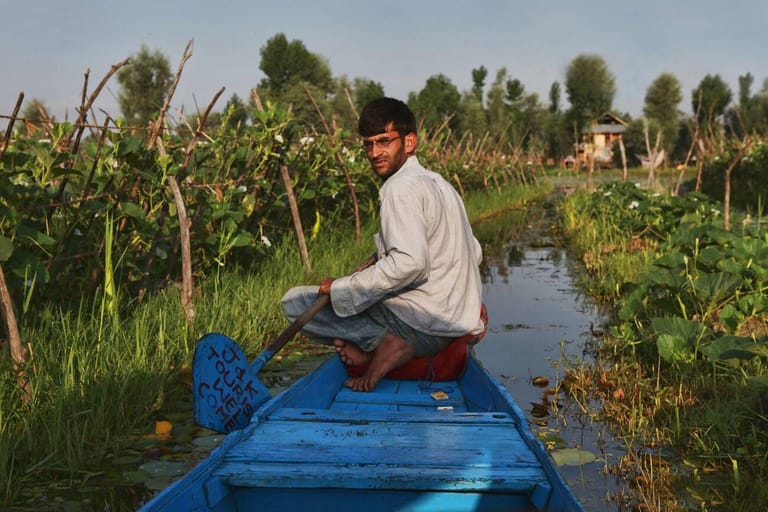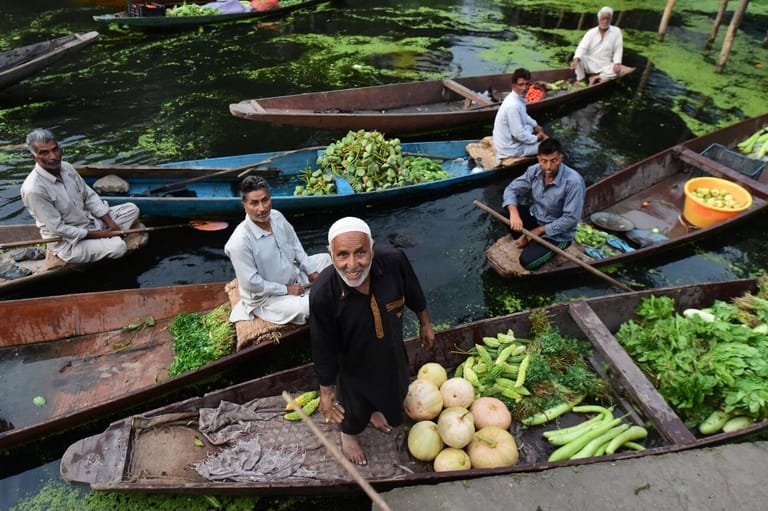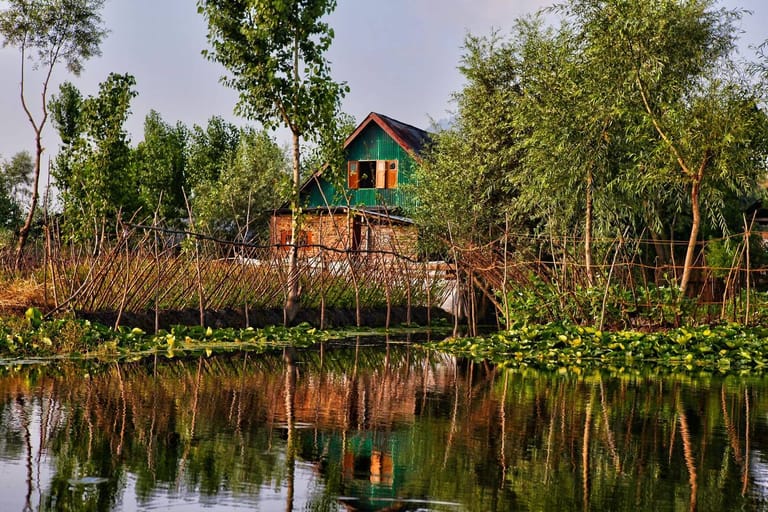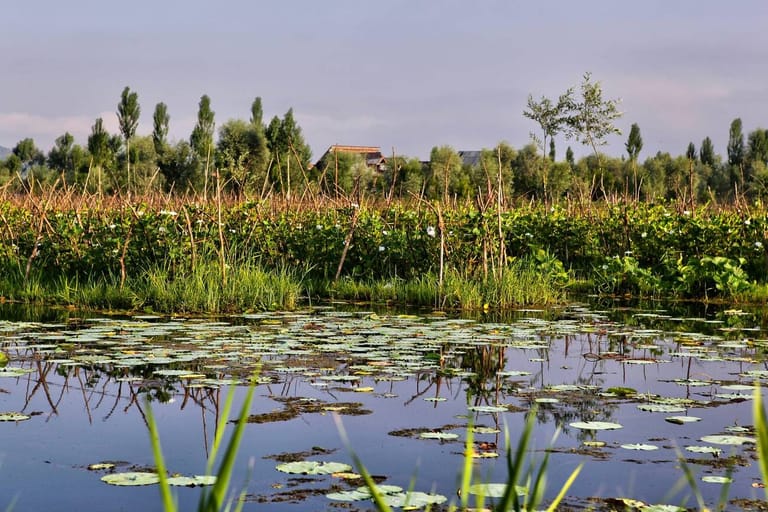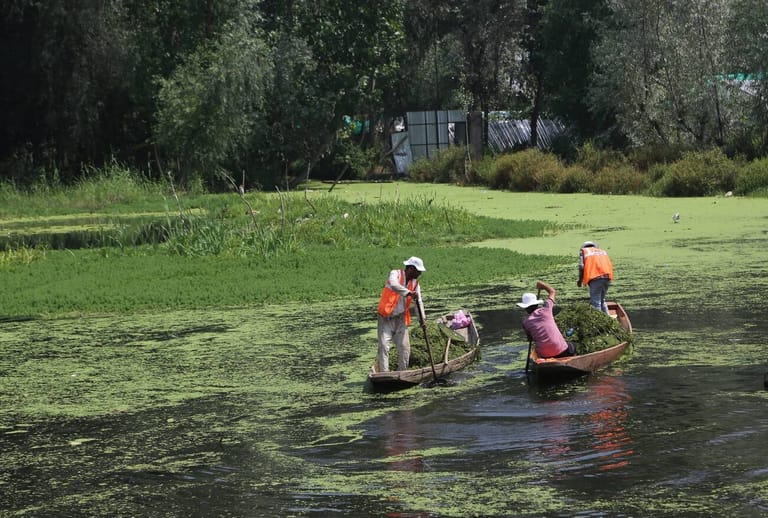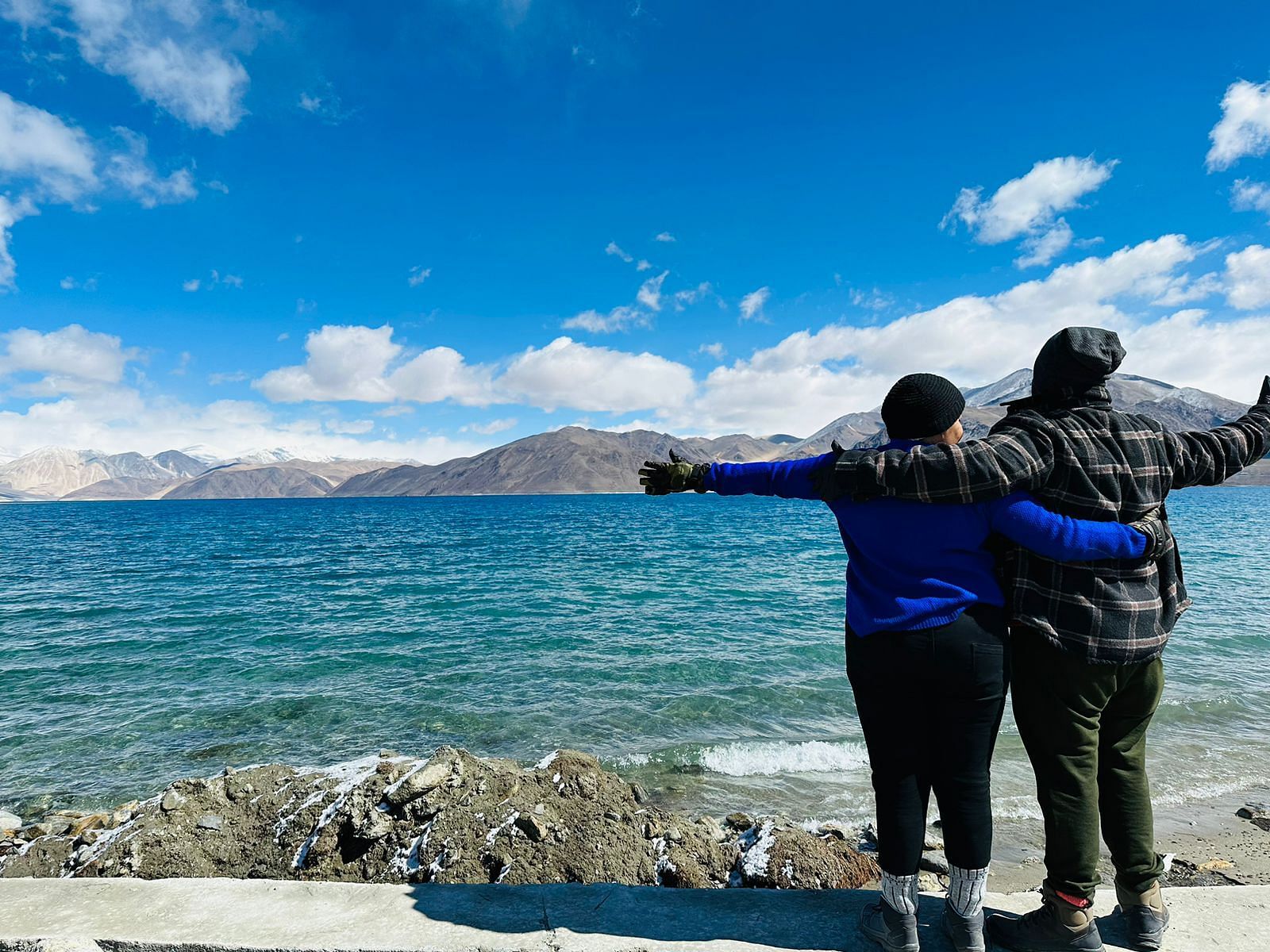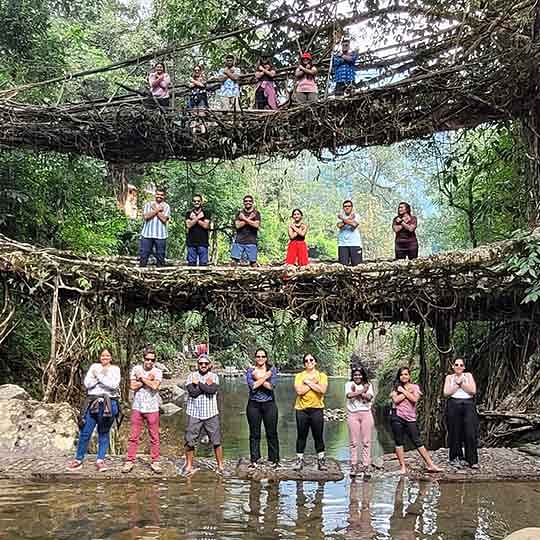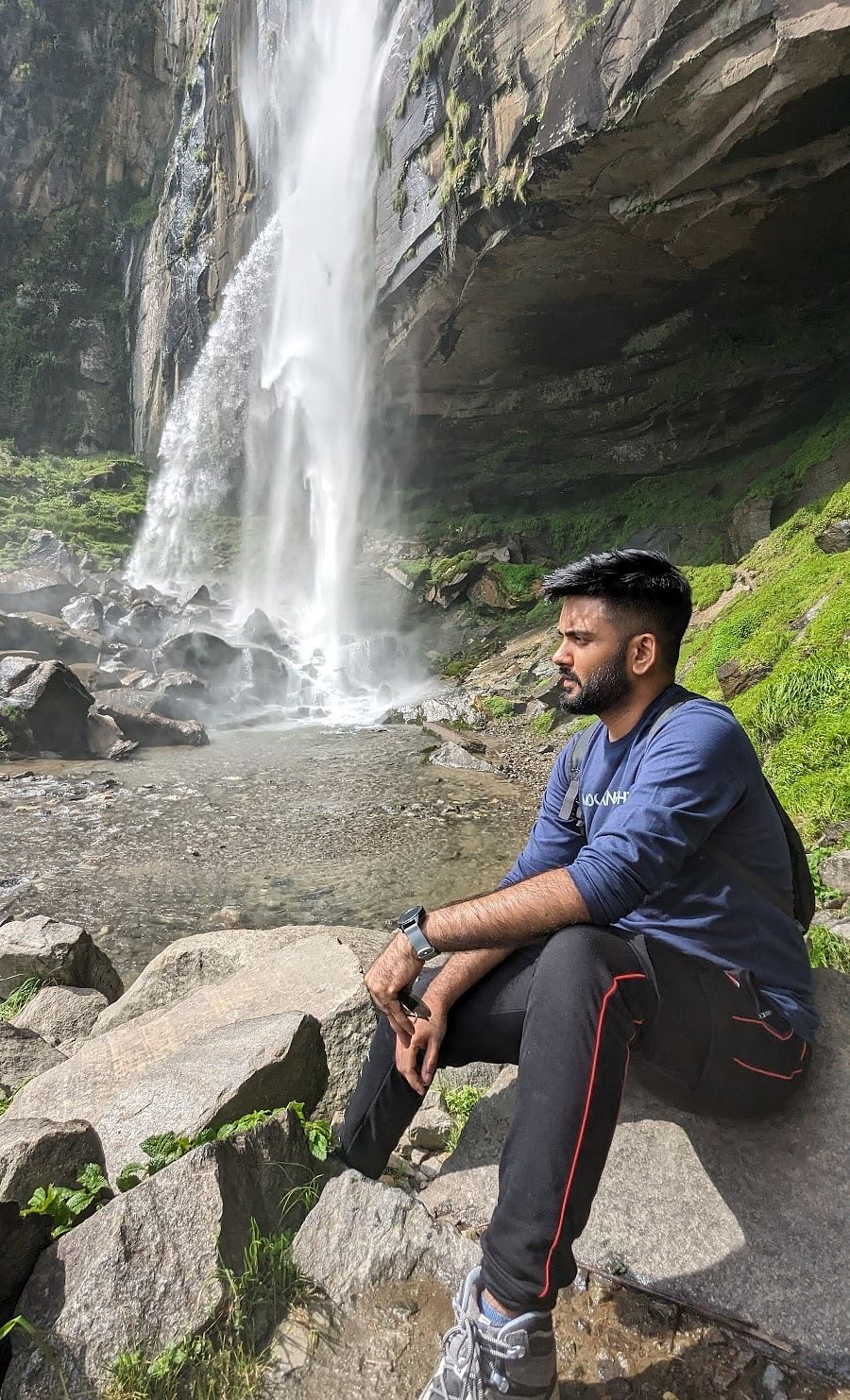You will not be able to believe your eyes upon seeing the Floating Gardens in Dal Lake - one of the most beautiful places to visit in Kashmir. The locals call these gardens "Rad," which are farm plots floating on water! Farmers have cultivated in this manner for centuries.
When you're looking for entertaining Things to do in Kashmir, ride a wooden boat through these gardens. It's quite fantastic to see farmers toiling on the water itself, cultivating ordinary vegetables such as tomatoes and cucumbers on what appear to be floating islands.
Attempt to go there in April through October, when everything grows just wild—the gardens are totally beautiful at that time. Our Kashmir Tour Packages will bring you there, generally also stopping at the houseboats and lovely Mughal Gardens nearby. These floating gardens just highlight how unique Kashmir is!
The Formation of Floating Gardens in Dal Lake is a remarkable blend of traditional knowledge and natural resources. These gardens are mainly made out of two species of aquatic weeds that grow in large quantity in the lake: pech (Typha angustata) and nargasa (Phragmites australis). The procedure consists of interweaving these weeds into floating mats that form the basis for cultivation.
Here's the step-by-step description of the process of formation:
1. Weed Harvesting: The pech and nargasa weeds are collected by farmers from the lake.
2. Formation of Mats: The gathered weeds are carefully knitted into loose mats, creating a strong foundation.
3. Layering: More layers of pruned weeds are added later on, which increases the mat's thickness and buoyancy.
4. Maturation: These mats take around three years to mature into strong floating gardens measuring approximately 2 meters in thickness, 3 meters in width, and 45 meters in length. Their sizes can differ according to certain needs.
This traditional process produces fertile, floating plots suitable for cultivating vegetables.
Suggested Read: Nigeen Lake Vs Dal Lake
Classification of Floating Gardens
The Classification of Floating Gardens in Dal Lake is based on their mobility and construction:
1. Raadh (Mobile Floating Gardens): The Raadh gardens are mobile because farmers can transport them over the lake. Tomatoes and melons are some of the selected crops to be grown, as well as pumpkins and cucumbers.
2. Demb (Static Floating Gardens): Static Floating Gardens or Demb are stationary garden structures that builders construct at either the lake shore or in shallow water locations. Demb floating gardens provide suitable conditions to grow turnips and radishes with carrots along with leafy vegetables during winter, followed by melons and tomatoes and cucumbers, and pumpkins in summer durations.
The classification system provides farmers with the opportunity to use the right cultivation practices fit for their specific plants while considering their environmental conditions.
Floating Gardens of Dal Lake
The Floating Gardens of Dal Lake are not just agricultural wonders but also cultural and economic supports for the communities. More than 6,000 families rely on the gardens to earn their living. The crops from the gardens are traded in the local markets, among them being the famous floating market on the lake, drawing both tourists and locals.
Traditionally, these gardens have yielded highly in fruits such as cucumbers and melons. Cites in the 19th century, for instance, the Gazetteer of Kashmir and Ladakh, 1880, indicate the rich yield from these gardens.
Floating Vegetable Gardens in Srinagar
The Floating Vegetable Gardens in Srinagar, especially those in Dal Lake, are model examples of organic farming. With the rich nutrient profile of the lake and the organic waste from the water weeds, the ground proves fertile for cultivation without the use of chemical fertilizers.
Crops commonly grown include:
- Leafy Vegetables: Spinach, amaranth, and coriander.
- Fruit and Vegetables: Brinjal (eggplant), tomatoes, beans, ladyfinger (okra), chilies, and bitter gourd.
- Herbs: Mint and others.
These organically grown vegetables are in high demand, not only among local consumers but also by institutions like the Badamibagh Cantonment Board and military establishments in regions like Kupwara.
Suggested Read: Kashmir Travel Guide
Crops Grown on Floating Gardens
The variety of crops grown on floating gardens in Dal Lake is staggering. The fertile condition of the floating gardens favors a variety of vegetables and fruits. Some of the prominent crops are:
- Cucumbers: Of historical importance and widely cultivated.
- Melons: Watermelons were particularly popular during the Mughal period.
- Tomatoes: Tomatoes grow well in the rich floating beds.
- Pumpkins and Gourds: Take advantage of the vast area of the floating gardens.
- Leafy Greens like spinach and other varieties are grown locally.
- Root Vegetables like turnips, radishes, and carrots.
The organic status of such gardens means that the produce is chemical-fertilizer-free, hence making them healthier and more nutritious.
Challenges Faced by Floating Gardens
Despite their sustainability and cultural significance, the Floating Gardens in Dal Lake face several challenges:
- Pollution: Dal Lake is polluted because domestic waste mixes with hotel waste and boat waste at the location. Domestic sewage, along with plastic waste and cleaning agents, contaminate the lake and cause its quality to deteriorate. Local farmers use chemical fertilizers that cause harm to the vegetation of their farms as well as pose a threat to marine life. The locals' agriculture is also harmed through water pollution, which weakens their floating gardens.
2. Decline of Dal Lake: Constructive encroachments, sediment accumulation, and climatic pattern changes have caused Dal Lake to contract. Lake depth reduces due to encroachment that destroys floating garden area and siltation. Lake depth reduces due to heat, which steams more water from the surface. The reduction in lake size causes serious problems for local farmers who require floating gardens for cultivation.
Suggested Read: Backpacking Trip to Kashmir
3. Climate Change: Climate change and unreliable weather patterns contribute to undesirable effects on Floating Gardens in Dal Lake. Overflow or lack of rain patterns at the gardens develop deconstructive environments for plant crops. Increasing temperature influences plant growth while atmospheric winds and storm patterns deteriorate floating construction pieces. The speedy climatic changes strain the usual farm life on the lake, which contributes to increasing challenges to local farmers.
4. Government Regulations: Authorities have moved some families from Dal Lake due to their efforts in controlling pollution and illegal activities. The conservation measures result in floating garden destruction, which leads farmers to lose their livelihood. The use of fertilizers alongside pesticides remains restricted, which limits their standard farming techniques. Some floating gardens lose their existence when lake-cleaning operations occur.
5. Tourism Pressure: Tourist activity nourishes Srinagar’s financial sector, yet it stays damaging for Dal Lake. Higher touristic activities generate excess waste and pollution, which results in deteriorated water quality. The operations of speedboats and shikara rides generate waves that harm floating gardens in the lake. The expanding land prices within Dal Lake's vicinity drove farmers to sell their garden territories to business people, thereby shrinking the floating farm count.
6. Lack of Awareness: The importance of Floating Gardens in Dal Lake remains unclear to most individuals living in the region and visiting as tourists. The habit of visitors throwing trash in the lake endangers both its ecosystem and environmental balance. Some members of the local population consider floating gardens outdated since they prefer to pursue contemporary agricultural techniques. If no conservation efforts alongside awareness programs take place, the future holds the complete disappearance of this traditional practice, which has survived for centuries.
Suggested Read: Hidden Places in Srinagar
The Dal Lake Floating Gardens are a good model of sustainable farming practices. The vegetable gardens give farm-fresh vegetables to the people of Srinagar using thousands of farmers. The Gardens serve crucial functions in Kashmiri cultural identity as well as its agriculture.
Pollution and the reduction of the size of lakes, along with climate change, endanger the survival of such gardens. Unless steps are taken to save Dal Lake, the future of these floating gardens is uncertain. The government and local people should join hands to save this remarkable tradition.
The Floating Gardens in Dal Lake are not only a tourist destination but also a mode of life for numerous Kashmiri farmers. They demonstrate how sustainable coexistence can be between man and nature. If conserved, these gardens can keep delivering food, resources, and loveliness to generations yet to come.




